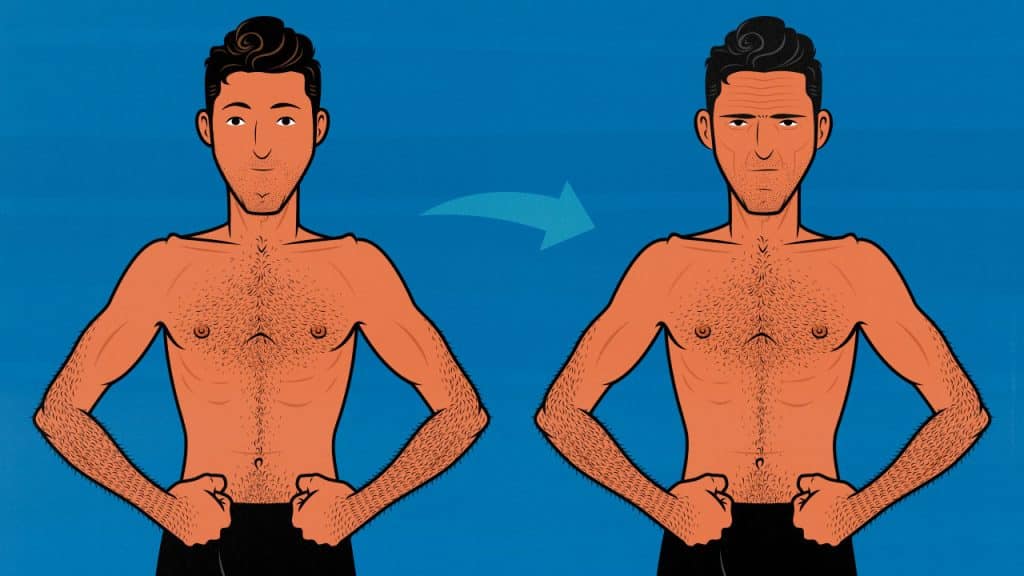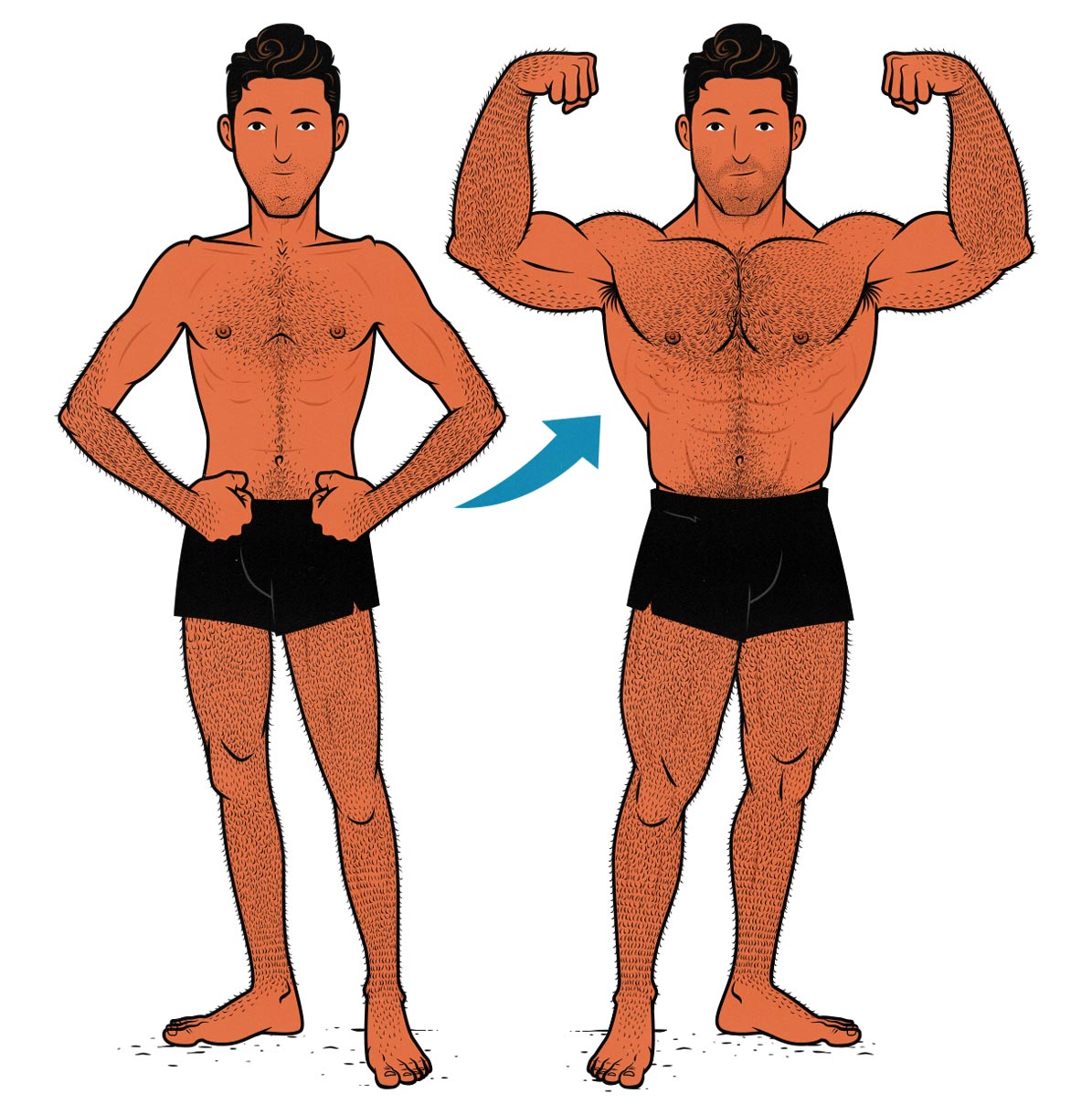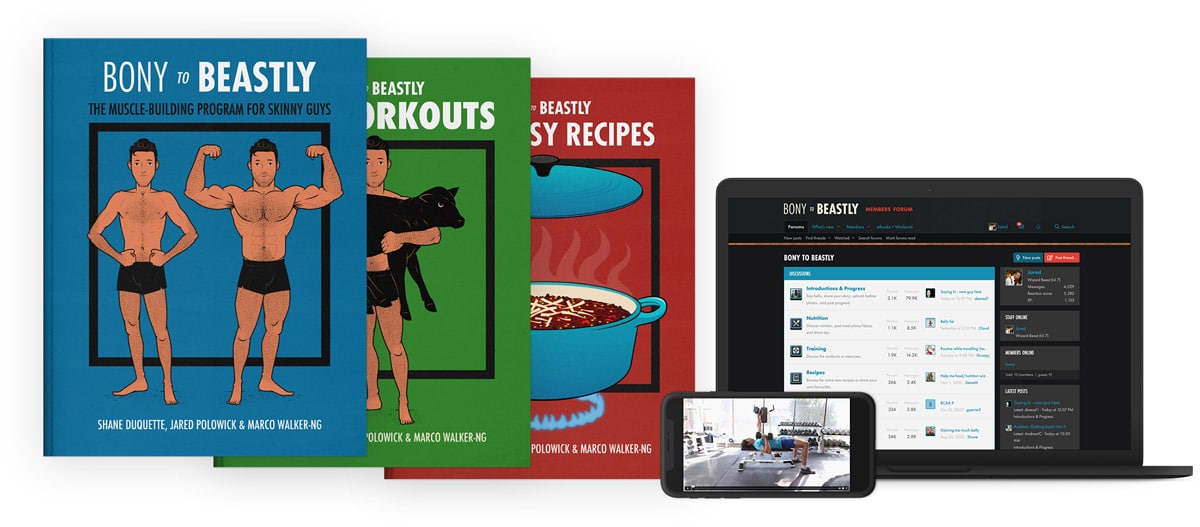
Why Aren’t You Gaining Weight in a Calorie Surplus?
You used a bulking calorie calculator, which told you how many calories you needed to gain weight. Then, you meticulously tracked your calories for several weeks, logging every single food that went into your mouth. And yet, somehow, you haven’t gained any weight. Or perhaps you gained weight during the first few weeks, but now the fount has run dry.
I struggled with this for years. It’s one of the most common questions we get from skinny clients. It’s rooted in a basic misunderstanding, and the solution is very simple, but you won’t like it.

Calorie Calculators Aren’t Perfect
The best calorie calculators will take into account your weight, muscle mass, exercise frequency, and lifestyle. Still, they can’t possibly be perfect. It’s just an estimate.
Some skinny people have much faster metabolisms than these formulas predict. Fat only burns a few calories per day, while muscle burns more like a dozen (explanation). That’s nothing compared to the hundreds of calories your heart burns, and your heart might be a little bigger or smaller than average, beating a little faster or slower at rest. The same is true of the rest of your organs.
It’s difficult to estimate your activity levels, too. Someone might think they’re inactive, but in truth, they sit when most people lounge, stand when most people lean, sleep a little bit less than average, and fidget while working. That can increase your metabolism by quite a lot, and you might not notice. After all, if you’ve been odd all your life, how could you know what normal feels like?
These calorie calculators will usually get you pretty close, but they can still be off by several hundred calories. Most bulking diets recommend a surplus of 250–500 calories. If your calculator is off by more than that, you won’t gain weight.
Your Metabolism Adapts
Metabolisms are adaptive. They have to be. We evolved during times when food could be scarce or plentiful. We needed a way to adapt to the calories that were available. During times of plenty, it was good to store some fat and gain some weight, but not too much. During scarcer times, our bodies needed to learn how to survive with less.
If you’re skinny, very lean, or underweight, then your body has been learning to make do with fewer calories. When you add more calories to your diet, your metabolism will speed up, using that extra energy. Maybe your organs become more active, your activity levels increase, and your body temperature rises. Those subtle changes can easily gobble up a few hundred calories per day.
Gaining weight will also increase your metabolism. But if you aren’t gaining weight, that isn’t your problem (yet).
You Aren’t in a Calorie Surplus
A calorie surplus is when you eat more calories than you burn. If you aren’t gaining weight, you aren’t eating more calories than you burn, so you aren’t in a calorie surplus.
The solution, then, is to get into a real calorie surplus. To do that, you need to eat more calories than you’ve been eating. That’s probably what you’ve been dreading, I know. I’m so sorry to be the bearer of such miserable news.
It’s incredibly common for naturally skinny guys to have a hard time eating enough calories to gain weight. I definitely did. For more, we have an article about how to eat more calories more easily.
How to Progressively Overload Your Calories
The trick is to gradually increase your calorie intake whenever you stop gaining weight. If 3,000 calories isn’t enough, try 3,200 calories. If that isn’t enough, add another 200 calories. Keep adding calories until you start gaining weight. That can be really difficult, I know, but it’s the only way to bulk up.
If you want to track your calories, use an app that adjusts your calorie recommendations based on how your weight changes. We’re affiliated with MacroFactor. We wrote a full review here. As far as I know, it’s the only app that adjusts your calories to keep you in a small calorie surplus. It’s also one of the easiest to use, and it uses a verified food database (making it more accurate). If you want to try it, you can get an extended free trial with the code “b2b”.
But you don’t have to track your calories. If you eat similarly sized meals at similar times every day, you’ll get into a steady rhythm. From there, you can eat a little more food whenever you stop gaining weight. That can be as simple as increasing your serving sizes, adding a side of milk (or milk alternative), or adding a small snack.

Alright, that’s it for now. If you want to know all the ins and outs of building muscle, we have a free newsletter. If you want a full foundational bulking program, including a 5-month full-body workout routine, gain-easy diet guide, recipe book, and online coaching, check out our Bony to Beastly Bulking Program. Or, if you want a customizable intermediate bulking program, check out our Outlift Program.
If you have any questions, drop them below. I’ll answer all the comments.


Muscle-Building Mini-Course via EMAIL
Sign up for our 5-part muscle-building mini-course that covers everything you need to know about:
Here are some related articles